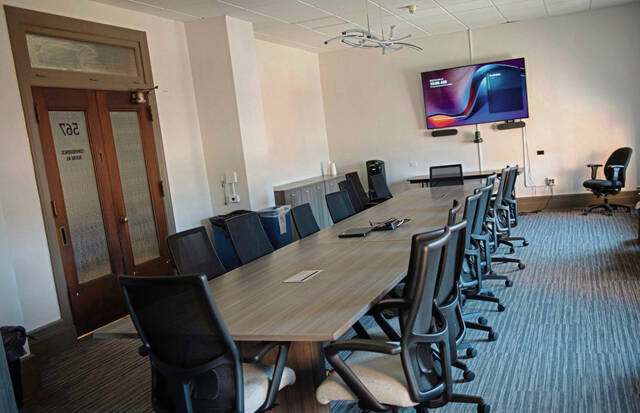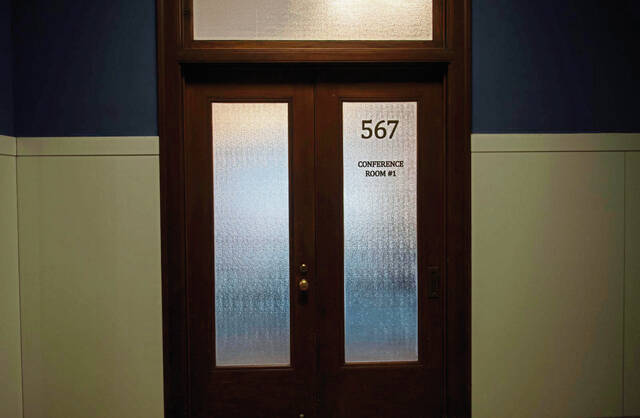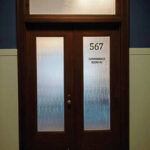For years, Pittsburgh City Council members have gathered behind closed doors to talk in private about public policy.
No one keeps a log of who attends. No minutes are maintained of what is said. And council members, desperate to ensure they don’t have too many people present, sometimes duck out of sessions to avoid a quorum of the nine-member elected body.
The only record of what is discussed can be found in the briefest descriptions in council’s online records: city debt, an anti-litter program, deer management and other mundane topics.
Council members treat these meetings as off-limits to everyone except aides and those whom they invite to join them in a nondescript conference room on the fifth floor of the City-County Building in Downtown Pittsburgh.
Experts say all the secrecy might violate the spirit of Pennsylvania’s open meetings law.
When asked last week about the private meetings, some council members acknowledged that they might be running afoul of the spirit of the Sunshine Act, which requires that deliberations among a quorum of members of a public agency take place in public in nearly all circumstances.
Even City Council Solicitor Dan Friedson acknowledged that at least some of these meetings ought to be open to the public.
In an interview last week, Friedson said he “can’t think of a single reason” why a March 27 meeting on deer management, for example, should have been held away from the public eye. Similarly, he raised concerns about the lack of openness for a recent off-limits gathering concerning the city budget, a hot-button issue lately as the city’s controller has warned of looming fiscal turmoil for Pittsburgh.
“There’s nothing in the Sunshine Act that says you can take the public out of the budget (discussions),” he said. “That’s a problem.”
Good government experts such as Paula Knudsen Burke, an attorney with the Reporters Committee for Freedom of the Press, also see a problem with the way council handles its business.
“The conduct of Pittsburgh City Council is undermining the spirit, if not the letter, of the Sunshine Act,” Burke said.
More than just listening
Pennsylvania’s Sunshine Act requires that public agencies — from the tiniest school boards to the biggest city councils, from the sleepiest municipal authorities to the most powerful commissions — deliberate and vote during public meetings.
The act aims to ensure transparency from elected officials by requiring most discussions be open to the public and the press, according to Melissa Melewsky, media law counsel for the Pennsylvania NewsMedia Association.
“The Sunshine Act is there because the law recognizes that government functions best when it functions in an open, transparent manner with the public involved,” Melewsky said.
There are exceptions.
Agencies can hold some meetings in private under narrow circumstances. Called executive sessions, they include discussions about legal or personnel matters and union contract negotiations.
Agencies also can receive briefings behind closed doors without public participation if they include “information flowing in one direction from a source to individuals,” Melewksy said.
But the meetings held by council — which they refer to as “briefings” — are neither the type of one-way gatherings envisioned in the Sunshine Act nor executive sessions. By council members’ own admissions, they do more than passively listen.
Several said they use the meetings to ask and answer questions, formulate opinions and discuss issues that may — or may not — later be discussed publicly. Some members said they might work to strike compromises on areas where they disagree.
At a March 13 meeting behind closed doors, for example, council members gave input about how money should be spent from the nearly $32 million Urban Redevelopment Authority’s taxpayer-funded affordable housing bond.
On March 19, council members raised concerns about a proposed expansion to the city’s contract for the ShotSpotter gunfire detection system. In December, they discussed a plan for $6 million in contracts for a controversial citywide master plan that was eventually passed.
“Transparency is a key component of good government,” said Lauren Cristella, president and CEO of Committee of Seventy, a good government group headquartered in Philadelphia. “If you can’t see what’s happening, you don’t know what’s working, and you can’t push for change or hold elected officials accountable.”
Eric Epstein, founder of Rock the Capital, a Pennsylvania-based good government watchdog group, said council’s actions leave their constituents in the dark about deliberations over important public issues.
“These government actions,” Epstein said, “are supposed to be held in the open and be deliberative.”
Not transparent
Council last year cloistered itself in executive session 24 times to hash out legal matters or to discuss other issues the Sunshine Act allows to be discussed outside public view.
Council also had 28 closed-doors “briefings” last year, though they largely did not appear to be about topics exempted from the Sunshine Act.
This year, there already have been 10 private briefings, plus five executive sessions.
Several council members described the closed-off meetings as casual conversations, compared to the more formal discussions they hold during public meetings.
Sometimes, members said, they have essentially the same discussions at public council meetings that they had in private.
Friedson — who said he does not attend all the private meetings and has not advised council one way or the other about holding such closed-doors sessions — said council should call for privacy only when they go into executive session to seek legal advice or discuss personnel matters.
“If they’re having closed-doors meetings and they’re deliberating, that would be a problem,” he said. “I do think that, generally speaking, if these elected officials ran on transparency, then they should operate on transparency.”
‘Vetting it out’
Council members interviewed last week about their private meetings displayed a range of interpretations of the Sunshine Act.
Erika Strassburger, D-Squirrel Hill, said she thought council could meet privately to talk about general topics as long as they didn’t discuss how they might vote on specific legislation.
The Sunshine Act, she said, “should be our North Star here.”
“I personally have always prided myself on government transparency,” Strassburger said, adding she would be open to introducing legislation or written regulations to provide clearer limits on what could be discussed in briefings without public access. “Anything we can do to reinstate some faith in our democracy, we should do.”
Councilwoman Theresa Kail-Smith, D-West End, said she “would love to have all the conversations publicly” except for executive sessions on personnel or legal matters.
“I think the public needs to know,” she said. “I’m not opposed to people hearing the briefings.”
Kail-Smith said her understanding was that council “has a right” to be briefed in the existing format, though she felt the public could benefit from those conversations.
Councilman Anthony Coghill, D-Beechview, said if the meetings may be seen as skirting the Sunshine Act, “then we should be concerned about it.”
“I always looked at (briefings) as vetting it out before we came to the public,” Coghill said, though he told TribLive he wouldn’t mind opening those conversations to the public.
Other council members said they like having an opportunity to discuss issues privately before discussing them in front of constituents and cameras.
“It’s a good way to hash things out,” said Councilwoman Barb Warwick, D-Greenfield. “I find them very helpful because you can have conversations and ask questions that you might not necessarily feel comfortable having at the table in front of the public and on TV.”
Council President R. Daniel Lavelle, D-Hill District, did not respond to repeated requests for comment last week.
‘Bad public policy’
For City Council, a quorum is a majority of members — five out of nine. The Sunshine Act says that in most cases, when a quorum gathers, the meeting must be public.
But when council gets together for its private discussions, members take pains to ensure there is no quorum. They do this routinely by splitting up council members and holding two smaller sessions.
Lavelle and Strassburger, who leads standing committee meetings as finance chairwoman, have even reminded their colleagues publicly about making sure to avoid a quorum during these gatherings.
At multiple recent meetings, they have told members to coordinate with the clerk’s office about which of two briefings on the same topic they plan to attend so they can remain below a quorum at each session.
Councilmen Bobby Wilson, D-North Side, and Bob Charland, D-South Side, have said they’ve stepped out of recent meetings for just that reason.
Some council members said they believe they weren’t running afoul of the Sunshine Act, noting that they meet without a quorum.
Melewsky, however, called such deliberate measures to avoid holding open meetings “bad public policy.”
Councilwoman Deb Gross, D-Highland Park, said she thinks private meetings are appropriate because there is no quorum and thus they aren’t violating the letter of the law.
These meetings, she said, help council members “come up to a base level of understanding” prior to public discussion.
“Since I’ve been on council, we’ve been doing it this way,” said Gross, who has served on council since January 2016.
Melewsky, however, said, “By intentionally avoiding transparency requirements, the agency is doing a disservice to their constituents.”
She called actions undertaken to deliberately avoid a quorum a “red flag.”
Wrong turn
It’s unclear exactly when these closed-doors meetings started. Council records indicate they’ve been happening since at least 2022, but at least two council members and their solicitor said they have been happening for years.
Several council members said the briefings have been occurring for years longer.
Former Councilman Doug Shields — who spent eight years on council until 2012 and worked as a council staffer before that — said that type of private meeting would never have been considered when he was in office.
He said he and his peers held executive sessions for topics like litigation and personnel matters, but all other conversations were held publicly.
“There are no carveouts I was ever aware of for briefings on policy matters, pending legislation or any other matter” beyond legal and personnel issues, Shields said.
“If the council is wandering into a gray area here, I would say it would be unwise to do so,” the former council president said. “It only makes things more complex and more difficult down the road. Once you take the wrong turn, all the other turns are wrong as well.”
Lavelle, the current council president, denied a TribLive reporter access to two recent briefings, saying they were limited to council members.
Doors to council chambers are locked, and the public is unable to access the conference room where these meetings take place.
The unadorned conference room — Room No. 567, also known as Conference Room No. 1 — has a long rectangular table, ergonomic chairs and a wall-mounted television. It’s at the end of a long hallway, beyond council offices, accessible only through council chambers or a secure glass door requiring visitors to be buzzed in by a secretary at a desk.
Multiple reporters were denied access last year when they tried to enter a private meeting about public safety matters.
By shutting down public access to these private meetings, council members are “stretching the law to its limits and really running afoul of its intent,” Melewsky said.
Such actions harm public trust, raise legal questions and create the appearance of impropriety, she said.
“That’s bad government,” Melewsky said. “I know they can do better.”











